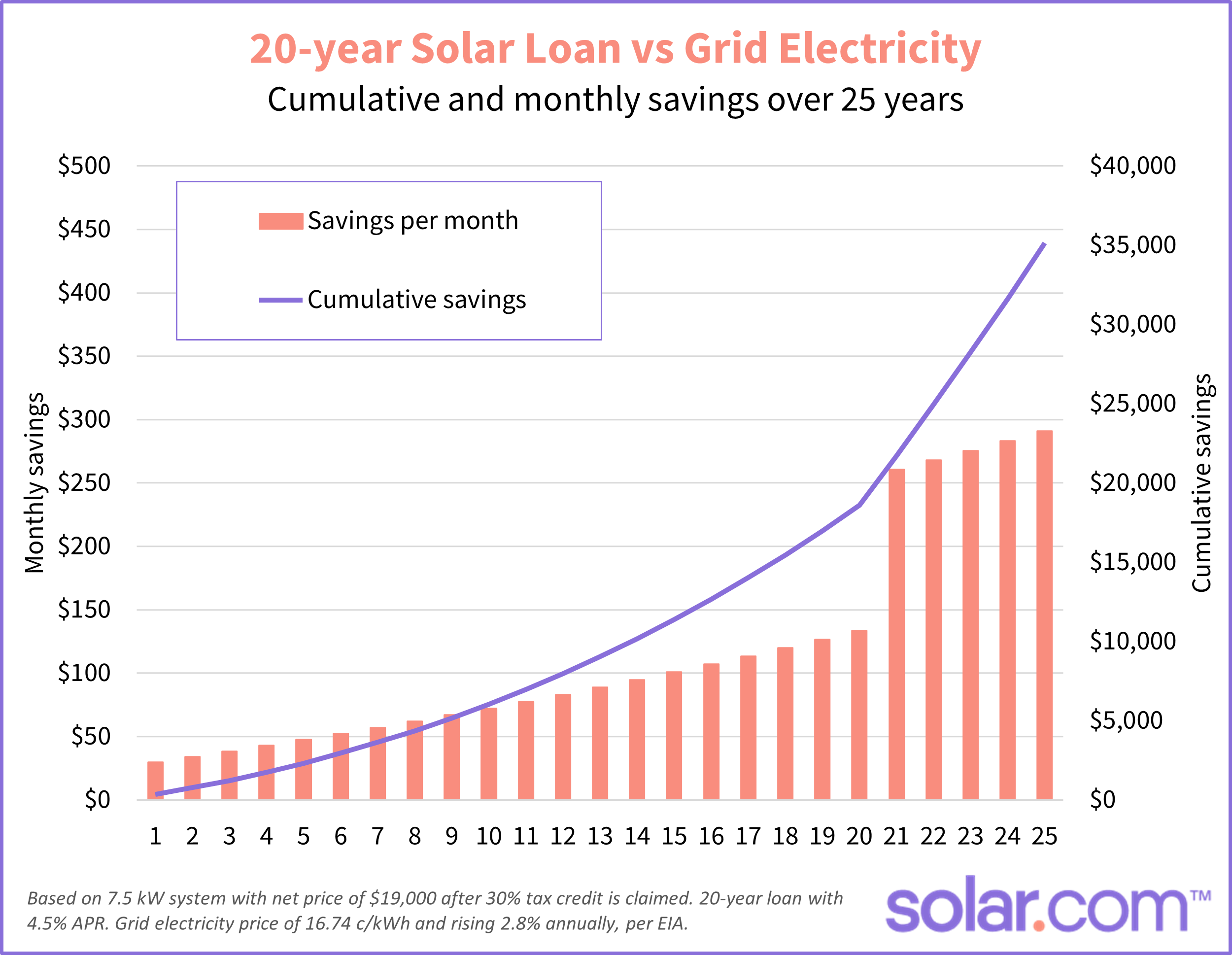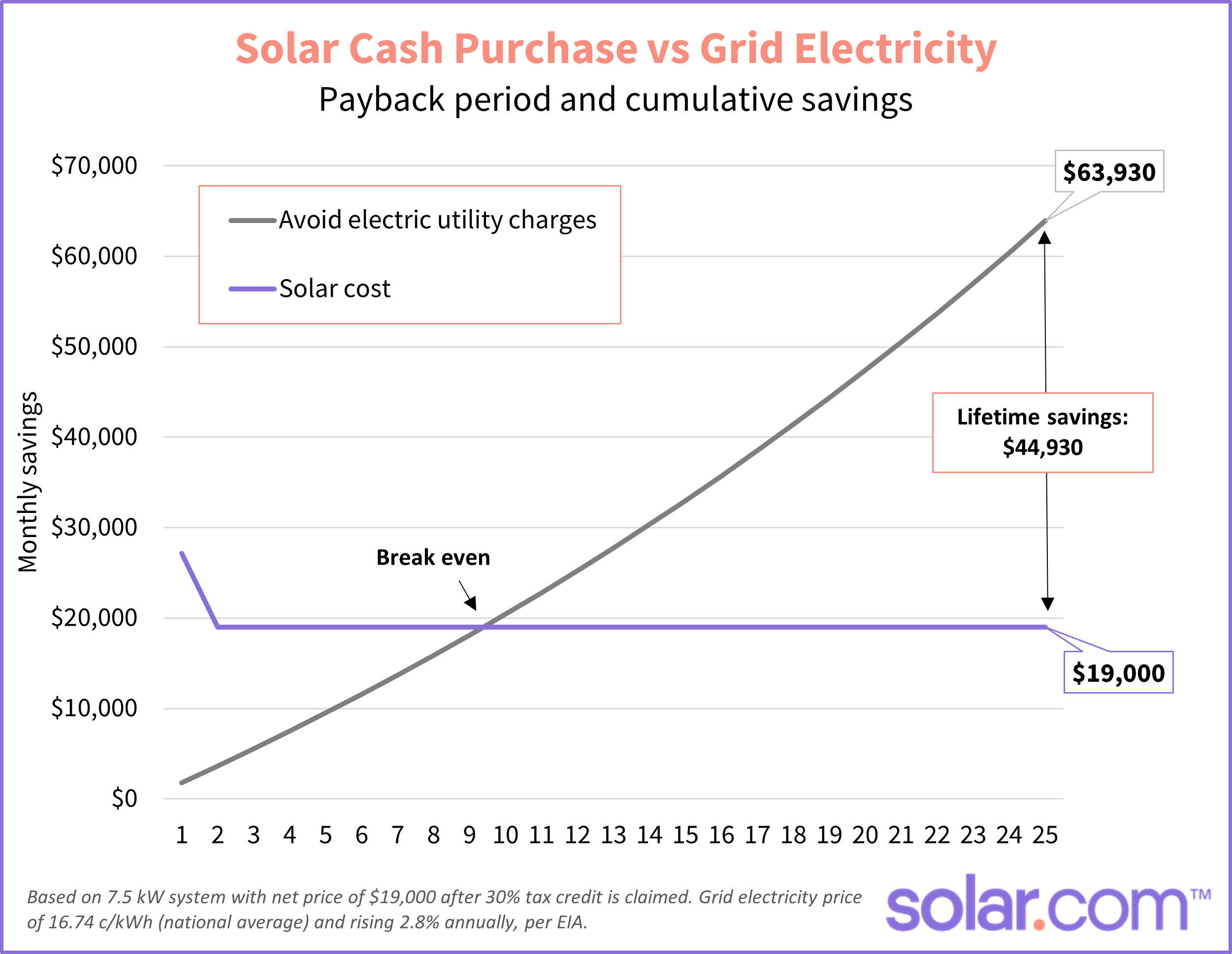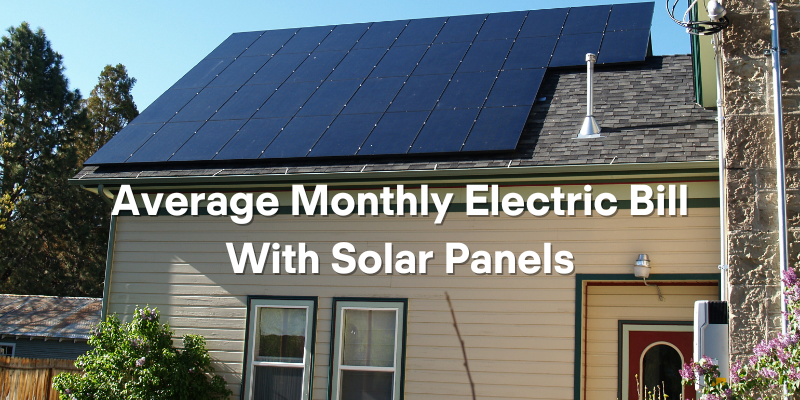What Is the Average Monthly Electric Bill With Solar Panels?
With utility rates rising and household electricity usage increasing, many homeowners are looking for a way to lower their electricity bills (without turning their house into a sweat lodge in the summer).
Home solar is touted as a way to reduce your electricity costs and carbon footprint, but how exactly do solar panels reduce electricity bills?
In this article, we’ll explore what an electric bill looks like for a home with solar panels and how much you can expect to save per month. Let’s start with a baseline based on national averages.
What is the average monthly electric bill with solar panels?
The average US electricity bill in the first half of 2023 was $146.92, based on monthly consumption of 881 kWh and the average utility rate of 16.7 cents per kWh per the EIA. A 7.5 kWh solar system with 5 peak hours of sun per day could more than offset the average homeowner’s electricity charges and save the full $146.92 in electricity charges.
Of course, every home in the US has a different mix of sunshine, electricity consumption, utility rates, and net metering policies. But in general, a properly sized solar system with 1:1 net metering can fully offset your monthly electricity bills (aside from certain fixed fees).
The map below shows the average electricity bill for each state in the US in 2023. Click or tap your state to get a better sense of how much you could save per month.
Now that we have a baseline, let’s take a look at what affects your average electric bill with solar panels.
How much can I save a month with solar panels?
You can calculate your monthly solar savings by subtracting the payments for your solar system from your average electricity bill. For example, if you have an average bill of $150 per month and your solar loan payments are $120 per month, then your savings would be $30 a month… to begin with.
However, it’s important to note that while your solar payments stay flat for the life of your loan, your electricity bill continues to rise as rates increase. So what starts out as $30 a month eventually becomes $50, $75, and eventually over $100 per month.
Due to the constantly rising cost of electricity, your solar savings add up and accelerate over time, as shown in the chart below.

You can increase your cumulative solar savings by paying cash for the system and avoiding the interest charges on a loan, as we’ll explore below.
How long does it take solar panels to pay for themselves?
With a cash purchase, solar panels typically take 7-10 years to pay for themselves – known as a payback period. With a properly sized system, your monthly utility electricity charges will be zero (aside from fixed fees), but it takes time to recoup the upfront investment in your solar system.
The chart below shows the payback period and cumulative savings of buying a 7.5 kW solar system with cash versus buying grid electricity at the national average price.

With a cash purchase, it takes around 9 years to recoup the cost of the system, but the lifetime savings are much greater than financing the same system with a loan.
Do you still have an electric bill with solar panels?
Yes, you will still receive an electric bill if you have solar panels. However, your solar panels will offset some or all of the charges on the bill.
How do solar panels work with your electric bill?
With that in mind, it’s important to have a good understanding of how your electricity bill looks with solar panels. Most utilities offer net metering, in which solar owners earn credit for the excess electricity they push onto the grid. This credit is used to offset the cost of the grid electricity they use when their panels aren’t producing, and shows up as a negative charge on the bill.
In many cases, you can accumulate negative charges during the spring and summer to offset fall and winter electricity bills when your panels aren’t producing as much electricity as you use.
The example bill below shows how net metering credits (yellow rectangle) are applied to an electricity bill to offset even basic fixed charges (orange rectangle) and, in this case, provide a negative bill for the month (yellow circle).

Of course, every utility has unique billing and net metering structures, so it’s best to ask a utility representative to walk you through a monthly electric bill with solar panels.
The bottom line
With a properly sized system and 1:1 net metering, solar panels will wipe out your entire monthly electric bill, aside from certain fixed fees.
If you finance your system with a loan, your monthly savings is the difference between your avoided electricity bill and the payments on your panels. If you pay cash for the system, you won’t have any monthly electricity payments, but it typically takes 7-10 years to recoup your upfront investment.
Electricity bills are rising nationwide and solar panels provide an effective solution for reducing your energy costs. Connect with an Energy Advisor to easily compare binding quotes from local installers.








